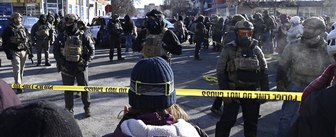Last week, former Minneapolis police officer Derek Chauvin went on trial for the murder of George Floyd. Floyd, a Black man, died in police custody after Chauvin, a white officer, restrained Floyd with his knee on his neck for nearly nine minutes. Three other police officers stood nearby as Floyd lost consciousness and told the officers he could not breathe.
Three in four Americans (74%) in the latest Economist/YouGov poll say they have seen the video of Chauvin restraining Floyd, and the public has made up its mind about the guilt of Chauvin. Though the trial is still ongoing, most Americans (57%) already believe he should be found guilty – more than three times as many as say he should not (18%).
But just two in five (40%) believe Chauvin will be found guilty. Just as many (41%) are not sure, and one in five (19%) believe Chauvin will not be found guilty.
Four in five Black Americans (79% vs 5%) vs believe Chauvin should be found guilty, compared to two-thirds of Hispanic Americans (66% vs 17%) and half of white Americans (51% vs 21%).
There is a large partisan gap in those who want Chauvin to be found guilty. Republicans aren’t all that sure he should be convicted, with slightly more saying he should not be found guilty (36%) as think he should be convicted (31%). Having seen the video has little impact on GOP respondents. Similar percentages of Republicans who have seen the video (33%) as have not (30%) believe Chauvin should be convicted.
Democrats are more than twice as likely as Republicans to believe the guilty verdict should be issued (84% vs 31%). About half of Independents (49%) say he should be found guilty, while about one-quarter (23%) believe the opposite.
Most Americans see a broader problem in how police treat Black Americans
Floyd’s death has affected American opinion about the police and their treatment of minorities. For many Republicans, the relations between minorities and the police seem fine.
By nearly two to one, Republicans believe that Black Americans and white Americans receive equal treatment from the police (52% say they do, 28% say they do not), something on which the public overall disagrees. By 56% to 27%, Americans overall think the treatment of Black Americans by police is different from the treatment the police give to White Americans.
That means that Republicans are much more likely to believe that the deaths of Black Americans while in police custody are merely isolated incidents (71%), not part of a broader problem (29%). Most of the public, Black and white, sees a broader problem. About half of white Americans see a broader problem (54% vs 46%), compared to three-quarters of Black Americans (74% vs 26%).
Perceptions of relations between minorities and the police in the United States are closely linked to what people think about overall race relations. Both are seen as generally bad.
Three in five Black Americans say police relations in their own communities are bad
Americans have worried about the state of race relations for a long time, though Republicans tend to be more positive. And many people see things as better in their own communities than they are in the country overall.
Republicans have a far rosier perception of both race relations in general and police-minority relations specifically. Three in five Republicans (63%) say race relations between minorities in America and the police are generally good, compared to 37% who say they are bad. Americans overall disagree (38% say they are good, 62% say bad). Black Americans (18% vs 82%) and Democrats (18% vs 82%) say relations between minorities in America and the police are generally bad.
Black Americans have more positive opinions of police relations in their own community than in the country overall — 39% describe relations between minorities and police in their local community as good, while 61% describe it as bad — but they remain divided about the state of race relations in their own communities (51% call it bad, compared to 32% of Americans overall).
While Black Americans see police relations as bad in their own communities, white Americans think the opposite. Two-thirds of white Americans (66%) say police-minority group relations in their own communities are good, while one-third (34%) say they are bad.
Related: For Americans, the right to bear arms doesn’t apply to those with a history of mental illness
See the toplines and crosstabs from this Economist/YouGov poll
Methodology: The Economist survey was conducted by YouGov using a nationally representative sample of 1,500 US Adult Citizens interviewed online between April 3 - 6, 2021. This sample was weighted according to gender, age, race, and education based on the American Community Survey, conducted by the US Bureau of the Census, as well as 2016 Presidential vote, registration status, geographic region, and news interest. Respondents were selected from YouGov’s opt-in panel to be representative of all US citizens. The margin of error is approximately 2.8% for the overall sample
Image: Getty








